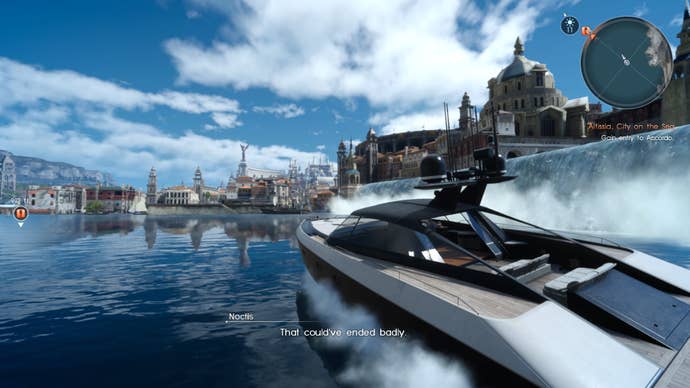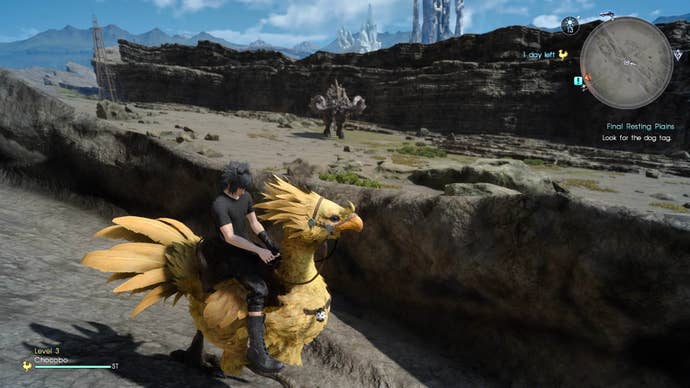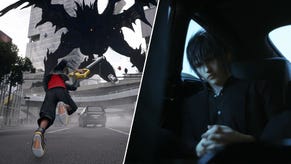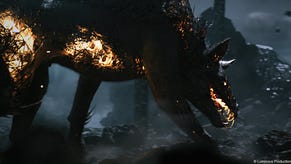After the Review: Let's Talk About the Second Half of Final Fantasy XV
The open world is great, but what about the second half?
This article first appeared on USgamer, a partner publication of VG247. Some content, such as this article, has been migrated to VG247 for posterity after USgamer's closure - but it has not been edited or further vetted by the VG247 team.
"After the Review" follows up on games shortly after their release. Did they make the right decisions? How are the fans reacting? We examine those questions and more. You can read our full review of Final Fantasy XV here, and make sure to check out our guides.
Minor spoilers follow.
One of the most common criticisms of Final Fantasy XV, outside of the problematic camera, is that it breaks with the format established in the first half game.
After spending roughly 20 hours tromping around Lucis, the gang hop on a boat and head to Altissia: a fanciful city that resembles the real-world city of Venice. It's here that the game's scope narrows considerably from the open-world of the first half to something much more constrained. You can still go on hunts and travel the city's waterways, but the Regalia remains firmly in storage.
After a major setpiece battle, the story's scope narrows still further. Though it offers the illusion of continuity due to the fact that you're on a train traveling the countryside, you're actually just moving from one story beat to the next with no chance to explore or strike out on your own. Thankfully, it's here that you regain access to the open-world with the help of a magical dog named Umbra. You can even gain experience and new gear despite it ostensibly taking place in the past.
But in the meantime, the game rumbles steadily toward its inevitable conclusion, mixing in a couple dungeons and a quick town stop along the way. Some have likened it to an inversion of Final Fantasy XIII, which opens with an extremely linear quest before opening up a bit later, but it's not a perfect comparison. For one thing, Final Fantasy XV's open-world is magnitudes more interesting than the equivalent in Final Fantasy XIII, which is much smaller and mostly empty. For another, FFXV's more linear segments are ultimately more interesting than anything FFXIII has to offer because FFXV's dungeons are much stronger, and the setpieces help to add a bit of pop.
So does the second half of Final Fantasy XV actually hurt the overall game? Well, yes and no.

In addressing this in my original review, I wondered if the move toward a more linear approach wasn't actually to the benefit of the story, writing, "Much as I would have liked for the roadtrips to continue through the entirety of the story, I wonder if it would have been a good idea to sacrifice the nostalgic element that emerges when they're taken away, as it proves to be a surprisingly powerful bit of storytelling. If nothing else, it turns what might have otherwise been a weakness into something positive."
I don't think it's too much of a spoiler to say that Final Fantasy XV's story takes kind of a dark turn past the midpoint. As the joyous sense of comraderie fell away, I found myself longing for the comparatively brighter moments spent hunting monsters, racing chocobos, and camping out under the stars. The shift in tone was mirrored in-game, as the protagonists became wistful about their time in Lucis.
As I noted above, such moments can prove particularly powerful in a videogame, as you are experiencing it rather than just passively watching it. You are right there with the main characters as they long for the brightness of Lucis amid the gathering gloom. I don't think that should be discounted in the overall story arc.

I think where a lot of people, myself included, part ways a bit with the linear portion of the game is that it happens a bit sooner than it should. As soon as you hit Altissia, the game mostly closes up, with even hunts and the odd sidequest eventually giving way to pure story. This is not uncommon for an RPG—the last disc used to be where PlayStation RPGs would dispense with the overworld for the final dungeon—but it's strange to see it hit so early in the game.
Then again, would another open-world section actually add that much to Final Fantasy XV? Our guides editor Jeremy Signor spent some 70 hours in just the first five chapters alone. There are a huge amount of optional dungeons, hunts, and sidequests to complete, as well as one very nasty postgame boss to fight. Yes, more is usually better, but Final Fantasy XV isn't exactly lacking for content.
What's more, outside of a strange stealth-focused dungeon that breaks with the main battle system and is generally way too long, the second half is actually pretty good from a storytelling perspective. It's dark, it has some really good battles, and it pushes the brotherhood between the main foursome to its breaking point. Outside of the aforementioned dungeon, there was never a point where I thought to myself, "I want this to end." One of the dungeons in the second half is one of the best and most wrenching of the entire game in the way that it drives home the enmity among the group.
In that sense, while I think the open-world sections are definitely more compelling than the linear sections, I don't think the back half of the game is altogether poor. Mostly, it serves to pick up the story's pace and drive it to a satisfying conclusion. More importantly, the contrast with the brightness of the first half is used to good effect to highlight the story's rising stakes. But most important of all is the fact that you can go back to the open-world pretty much anytime you want after a certain point, offering a respite from the story and letting you resume the quests that you originally picked up. That more than anything saves the second half from being a frustrating and limiting run to the end. As awkward as the framing device for the transition back to the open world is, it's essential.
Like everything else in Final Fantasy XV, the linear portions are interesting in their own way, and the reasoning behind their inclusion isn't as easy to dismiss as it first appears. Happily, if you don't like them, you can always delve back into your memories and explore the fields of Lucis for as long as you want. But if you, you'll be missing out on one of the better Final Fantasy stories in a while.









